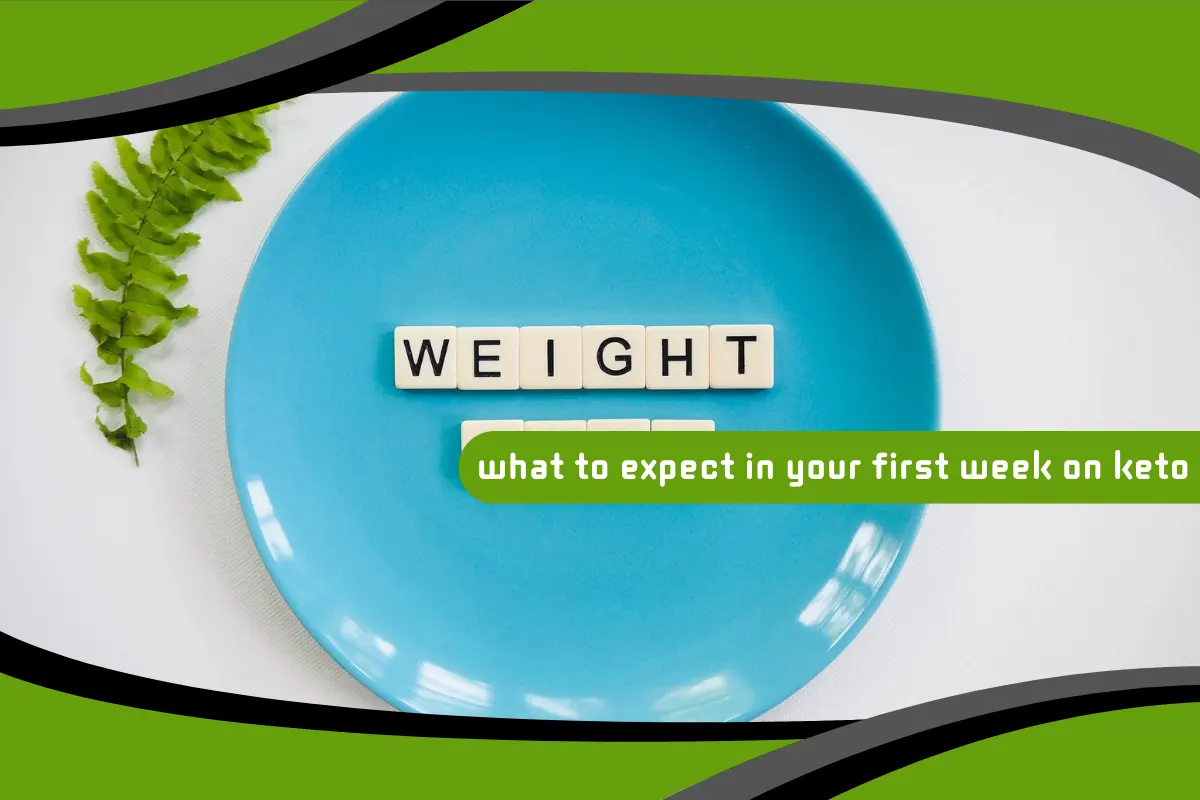Embarking on a ketogenic (keto) diet is a significant lifestyle change that can bring about a range of changes in the body and mind. The first week on keto is particularly crucial, as your body starts to adapt to a new fuel source. Instead of burning glucose from carbohydrates, your body transitions to burning fat for energy, leading to both physical and mental adjustments. Expect to experience a variety of effects, some of which may be unexpected. Understanding these changes can help you navigate your first week successfully.

Understanding the Keto Diet: A Quick Overview
The keto diet focuses on drastically reducing carbohydrates and increasing fat intake. This shift forces the body into a state of ketosis, where it burns fat for fuel rather than carbohydrates. This transition can be challenging for the body, but it is necessary for achieving the benefits associated with keto, such as weight loss, improved energy, and better mental clarity.
Initial Energy Dip: The First Few Days
As your body shifts from using carbohydrates to fat as its primary fuel source, it is common to feel a temporary decrease in energy. This period, often referred to as the “keto flu,” can last anywhere from a few days to a week. Symptoms can include fatigue, headaches, irritability, and brain fog. These are all normal reactions to the diet’s shift and should subside as your body adjusts.
Watch also: Keto Diet Side Effects: How to Avoid Common Symptoms and Stay on Track
Increased Urination and Dehydration
In the early stages of keto, you may notice an increase in urination. This happens because glycogen, the stored form of carbohydrate energy, binds with water. As your body burns through glycogen, excess water is released, leading to frequent urination. This can result in dehydration, so it’s crucial to drink plenty of water and replenish electrolytes to stay hydrated and avoid complications.
Electrolyte Imbalance: The Importance of Salt, Potassium, and Magnesium
Along with increased urination, your body will also excrete more electrolytes, such as sodium, potassium, and magnesium. These minerals are essential for various bodily functions, and an imbalance can lead to symptoms like muscle cramps, dizziness, or headaches. To combat this, ensure you’re consuming enough salt and foods rich in potassium and magnesium, such as leafy greens and avocados.
The Keto Flu: A Temporary Setback
The “keto flu” is a common experience during the first week on keto. Symptoms of this flu can range from headaches to fatigue, dizziness, and irritability. This occurs as your body adjusts to burning fat for energy instead of carbohydrates. While these symptoms can be uncomfortable, they are temporary and usually subside after the first few days to a week.
Cravings for Carbohydrates
One of the most challenging aspects of starting keto is dealing with cravings for carbohydrates. After years of consuming a high-carb diet, your body may initially crave bread, pasta, and sugar. It’s important to recognize that these cravings are temporary and will decrease over time as your body adapts to ketosis.
Possible Digestive Changes: Constipation and Bloating
As your body adjusts to the keto diet, you may experience digestive changes. Constipation is a common issue for many new keto dieters, as the diet lacks fiber-rich fruits and grains. Additionally, bloating can occur as your body adapts to high-fat foods. To combat these issues, try incorporating low-carb, fiber-rich vegetables like spinach, kale, and zucchini.
Mental Clarity and Focus: Early Benefits
Though the first week on keto can be challenging, some individuals begin to experience improvements in mental clarity and focus. This happens as the brain starts to use ketones as an efficient fuel source instead of glucose. Many people report feeling more alert, focused, and less foggy once they’ve passed the initial adjustment period.
Appetite Suppression: A Surprising Benefit
One of the unexpected benefits of starting keto is appetite suppression. The high-fat, low-carb nature of the diet leads to reduced hunger and cravings. Many keto dieters find that they are able to go longer without feeling hungry, which can be helpful for weight management and reducing the temptation to snack frequently.
Sleep Disruptions: Temporary Adjustments
During the first week on keto, some people experience disruptions in their sleep patterns. This can be caused by changes in metabolism and energy production. While it’s common to have difficulty sleeping at first, these disturbances usually resolve once the body becomes fully adapted to ketosis. To help with sleep, consider incorporating magnesium-rich foods or supplements into your routine.
Increased Fat Burning: A Long-Term Benefit
While fat burning doesn’t happen overnight, many individuals begin to notice weight loss in the first week on keto. As your body adapts to using fat for energy, it starts to break down stored fat, leading to gradual weight loss. This can be motivating, especially when combined with the other positive effects of keto.
The Importance of Staying Consistent
During your first week on keto, consistency is key. The more strictly you adhere to the diet, the sooner your body will enter and maintain ketosis. While it can be tempting to cheat with a carb-heavy meal, doing so can delay the transition to fat burning. Stick to your plan and trust the process to see the best results.
Watch also: Is the Keto Diet Safe for Everyone? Expert Analysis on Who Should and Shouldn’t Follow Keto
Adjusting to High-Fat Meals
The shift to a high-fat diet can be a major change, especially if you’ve been accustomed to a lower-fat eating plan. You may feel initially uncomfortable with the amount of fat in your meals. Over time, however, your body will learn to utilize fat as its primary energy source, and your comfort level with fat-rich foods will improve.
Monitoring Your Progress
During the first week on keto, it’s essential to monitor your progress. Keep track of your weight, energy levels, and any changes in mood or mental clarity. This will help you gauge how well your body is adapting to the diet and allow you to adjust your approach if necessary.
Hydration and Electrolyte Supplementation
Given the increased risk of dehydration and electrolyte imbalance, it’s crucial to focus on hydration during your first week on keto. Drinking water regularly and incorporating electrolyte supplements can help prevent discomfort and support your body’s transition to ketosis.
Adjusting Social Situations and Dining Out
Social situations, such as dining out or attending gatherings, may present challenges during the first week on keto. Many foods served in social settings are high in carbohydrates. It’s important to plan ahead and bring your own keto-friendly snacks or meals to ensure you stay on track with your diet.
How Exercise May Feel During the First Week
You might notice that your exercise routine feels more challenging during the first week on keto. This is due to the transition your body is undergoing as it shifts from burning glucose to burning fat for fuel. While your body adapts, you may experience a temporary dip in exercise performance. However, this is a temporary setback, and many people see an improvement in their workouts after fully adapting to keto.
Building a Support System
Having a support system during your first week on keto can make a significant difference. Whether it’s a friend, family member, or an online community, connecting with others who are also following the keto diet can provide motivation, advice, and encouragement. This support can help you stay committed and navigate any challenges you face.
The Long-Term Benefits of Keto
While the first week on keto may feel challenging, it is just the beginning of a long-term journey toward better health. As your body adapts to the diet, you can expect to experience sustained weight loss, increased energy, improved mental clarity, and other health benefits. Staying patient and consistent is key to enjoying these long-term rewards.
Conclusion: Patience is Key
The first week on keto is a period of adjustment, and it’s essential to be patient with your body. While you may experience discomfort, these changes are signs that your body is adapting to a new way of eating. With time, the initial symptoms will subside, and you will begin to reap the benefits of the ketogenic diet. Stay consistent, listen to your body, and embrace the journey.
Watch also:How to Start the Keto Diet: A Complete Step-by-Step Beginner’s Guide



No comment